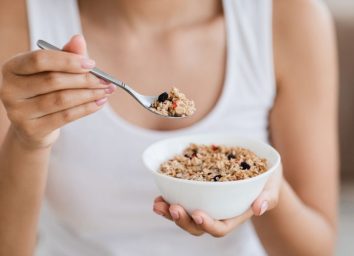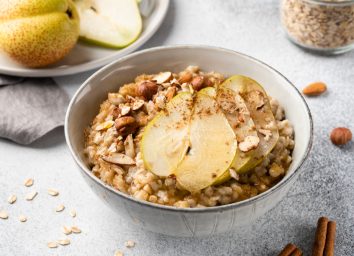I Learned I Had Leaky Gut. Here's How I Fixed It

In 2018, I struggled with some pretty uncomfortable gastrointestinal issues. I was bloated after most of the food I ate, I experienced stomach cramps on a regular basis, I was tired all of the time, and while I'll spare you the details, I was running straight to the bathroom as soon as I woke up every morning.
After talking with my doctor and running a couple of tests, it seemed like there weren't any alarming issues causing things to be out of whack. My doctor suggested that the issues I was experiencing were most likely related to the health of my gut microbiome. She brought up the possibility of leaky gut, a term I had never heard before.
"Leaky gut," which is still widely debated in the medical field and is not recognized by everyone, is essentially the term for a weakened intestinal lining. The lining is what forms a protective barrier, so if this becomes weakened at all, it can let toxins into your body. According to Harvard Health, this can trigger symptoms like inflammation, bloating, pain, and gas.
According to my doctor, the best way to treat the issues I was having was to take better care of my gut health and see if the symptoms improved. She suggested eliminating certain inflammatory foods, while also adding important vitamins and nutrients to my eating plan.
I took probiotics and prebiotics
The difference between probiotics and prebiotics can be a bit confusing, but together they can work wonders for your intestinal lining and overall gut health.
According to Cleveland Clinic, probiotics have been found to help keep the "bad" bacteria in your gut from overgrowing. Prebiotics act as food for your gut, which helps keep it healthy.
You can find probiotics and prebiotics in foods or in supplement form. I focused on eating foods like bananas, garlic, onions, and apples for prebiotics, and I incorporated fermented foods like kimchi, kombucha, and tempeh for a dose of probiotics.
On weeks when I had a hard time incorporating these specific foods, I took prebiotic and probiotic supplements!
I limited my consumption of alcohol and added sugars
Alcohol and added sugar can both contribute to gut issues, especially if consumed in large quantities. According to a study published in Molecular Medicine Reports, alcohol can negatively impact the permeability of the intestinal barrier. And another study from BMC Gastroenterology found that higher consumption of added sugar can have the same effect on your gut health.
To help heal my leaky gut and give my gut health a break, I decided to eliminate alcohol from my diet for at least a month. I didn't completely eliminate added sugars, but I did limit them whenever I was able.
I drank a lot of bone broth
This one may sound weird to some, but drinking bone broth on a regular basis significantly helped my gut. Because of bone broth's higher levels of collagen, it has been found to help repair the mucosal lining of your gut and improve your overall gut health.
I wound up mostly making my own broth, but there are plenty of options that you can find at the grocery store, too.
The end results
I can easily say that the changes I made were well worth it. After about a month of switching up my eating patterns, I felt an enormous difference in my gastrointestinal health. My stomach discomfort was gone and I had my regular digestion back. I no longer had to run to the bathroom first thing in the morning, and I even felt a ton of energy come back during the day.
If you're experiencing some of the same symptoms I had, I would recommend talking with your doctor or dietitian about your gut health as soon as possible.









